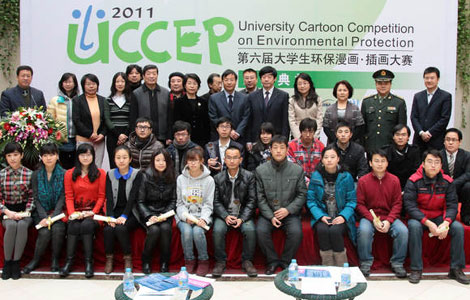Official: Patent licensing grows with innovation
Updated: 2011-12-28 13:58
By Wang Xin (China Daily)
|
|||||||||||
Number soars to 10,000 from just 118 agreements
As more innovation is developed and available, patent licensing is expected to show strong growth in China, according to a senior official at the State Intellectual Property Office (SIPO).
Cao Donggen, vice-director of SIPO's patent administration department, told a conference in Beijing on Dec 22 that an increasingly active licensing trade has emerged due to new patent alliances and IP firms in big cities like Beijing, Shanghai and Guangdong.
In 2007, just 118 patent licensing agreements were filed with SIPO. The number has surged to around 10,000 annually since 2008.
The growing capability of companies to use the intellectual property system, as well as the rising number of applications and improved patent quality, have laid the groundwork for the licensing trade, Cao said.
SIPO received more than 391,000 patent applications last year as China moved to second place globally.
International patent filings from China under the Patent Cooperation Treaty comprised 7.6 percent of the world's total, fourth following the United States, Japan and Germany.
Internationally, patent royalty and licensing fees increased from $2.8 billion in 1970 to about $180 billion in 2009, outpacing growth in global GDP, according to "The Changing Face of Innovation", a report released by the World Intellectual Property Office in mid-November.
"There is far less data on domestic IP transactions, but selected company information confirms this trend," the report says.
The explosion in patent applications in China will help the country become the world's second largest patent market after the United States, Yuan Jiann-Jong, a senior IP consultant from Taiwan, said at the meeting.
Bargaining chip
Just as raw materials are necessary for production, entrepreneurs should accept that it is normal to pay for patents as a needed component, he said.
"While research institutions explore frontier studies, generating patents that are licensable as a business needs a clear view of customer needs."
And like antique experts who can distinguish the true article from a fake, venture capital funds undertake due diligence to recognize what patents are marketable and worthy of investment, he noted.
Firms focused on investing in patent portfolios are like "arsenals" that provide "useful resources", Yuan said, adding that patents can serve as "a bargaining chip for commercial competition and market position".
Corporate moves
Different from intermediary firms specializing in IP, industrial companies are more concerned about how to incorporate IP assets into their routine production.
Global technology powerhouse IBM Corp has made more investment in intellectual property than for tangible assets in the past decade, said Zhang Yan, legal director of IP affairs for IBM's Asia-Pacific operations.
IBM's IP tactics are at the core of its strategic development plans, Zhang said.
The company earns $1 billion a year from intellectual property, including patent transfers, licensing, and joint research and development programs, she added.
China's telecommunication giant Huawei Technologies has just set off in that direction and is generating millions of dollars yearly in patent revenue, said Fan Zhiyong, vice-director of the company's IP department.
Huawei seldom had patent deals before 2009 unless other companies came to its door seeking cross licensing.
But the attitude has now changed.
"We are now more active in exploring cross-licensing probabilities, and establishing patent pools to increase transparency and control costs," Fan said.
He cited Huawei's participation with South Korea in a transnational patent pool for wideband audio to illustrate benefits that patent operations have brought to the company. Huawei received the largest royalties of any licensing company in the program.
Related Stories
Flip side of IPR protection 2011-01-20 17:36
IPR efforts redoubled as US visit nears 2011-01-13 08:05
Lawsuits to grow as patent filings rise 2010-12-14 08:05
Police follow a twisting trail of go-betweens to bag counterfeiter 2011-03-23 11:26
Improved IPR protection 2011-03-14 15:31
- Officials jailed for insider trading
- Youku and Tudou suing each other
- Wen stresses agriculture, farmers' rights
- Fast growth in fiscal spending
- CNPC gets OK for Afghan project
- China to test means of setting gas prices
- China issues charging standards for electric cars
- Developers go cold on once-hot lots










